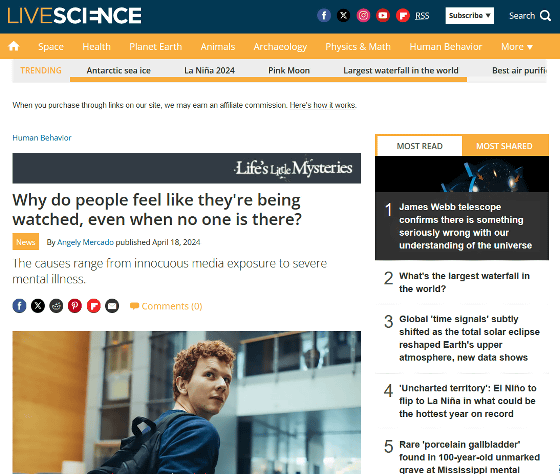Why do we feel like someone is watching us even when there is no one around?

Many people have experienced feeling someone looking at them in the street or on a vehicle, or feeling like they are being watched by someone in their room or bathroom when they are supposed to be the only ones there. Live Science, a science news media, explains why people feel like they are being watched by someone even though there is no one around.
Why do people feel like they're being watched, even when no one is there? | Live Science

According to clinical psychologist and forensic scientist Leslie Dobson , there are a number of reasons why people may feel like they are being watched. These can range from horror movies or novels, frightening news, stressful or traumatic events, or serious mental conditions. 'In more extreme cases, people may experience paranoia or hypersensitivity, which is often linked to an underlying mental illness or physical pathology in the brain,' says Dobson.
Of course, there may be cases where you are not just imagining things, but are actually being watched by someone. A 2016 paper suggests that humans have likely evolved to be sensitive to the gaze of others, and that the brain has a neural network dedicated to processing gaze.
Sensing the gaze of others is not that difficult in itself: humans can tell where others are looking by looking at their pupils, and can also use cues such as body language seen in peripheral vision. The ability to sense someone's gaze could be useful for socially active humans to engage in cooperative interactions.
Recent research has also shown that people implicitly think of their gaze as a kind of 'beam with physical properties.'
People implicitly think of 'gaze' as something like a beam with physical properties - GIGAZINE

However, some people may feel gazes on them in situations where no one is supposed to be watching them, such as when they are alone in their room at night. This can happen due to a momentary sense of fear, such as after watching a horror movie, but it can also occur in people who have experienced a traumatic event in the past.
A 2023 study showed that this hypervigilance could be a defense mechanism to avoid danger and ward off future stress. ' The amygdala processes emotions like stress and anxiety. When the amygdala becomes overactive or damaged due to a stressor like a physical injury or ongoing trauma, it can heighten emotional responses like perceiving threats,' Dobson said.
Dr. Alice Ferrer, a clinical psychiatrist based in California, points out that feeling like someone is watching you is not uncommon. However, if the feeling goes into the delusional realm, such as 'I'm being watched by someone all the time, regardless of time or place,' or 'I'm being watched for weeks on end,' it can interfere with your daily life.
'When you have a mental illness, you lose the ability to say, 'This is just how I feel,' and you lose insight into your own physical and mental processes. You can see reality, but it doesn't necessarily stick,' says Ferrer.
In fact, symptoms of schizophrenia include hypervigilance and paranoia, including the feeling that someone is watching you. Previous studies have shown that people with schizophrenia have abnormal activity in the limbic system , including the amygdala, and research has shown that paranoia in schizophrenic patients is associated with increased blood flow to the amygdala. It has also been suggested that abnormal connectivity between the amygdala and areas such as the visual cortex and hippocampus is associated with paranoia.

Whatever the cause, Dobson and Ferrer advise that if the paranoia continues and you feel watched in situations where no one else should be, it's time to seek mental health support. Dobson said: 'We urge people to seek psychological and medical intervention if they realise they are suffering. Early intervention is key. If you're suffering multiple days a week or it's affecting your work, studies or relationships, it's important to seek out a specialist.'
Related Posts:
in Science, Posted by log1h_ik







